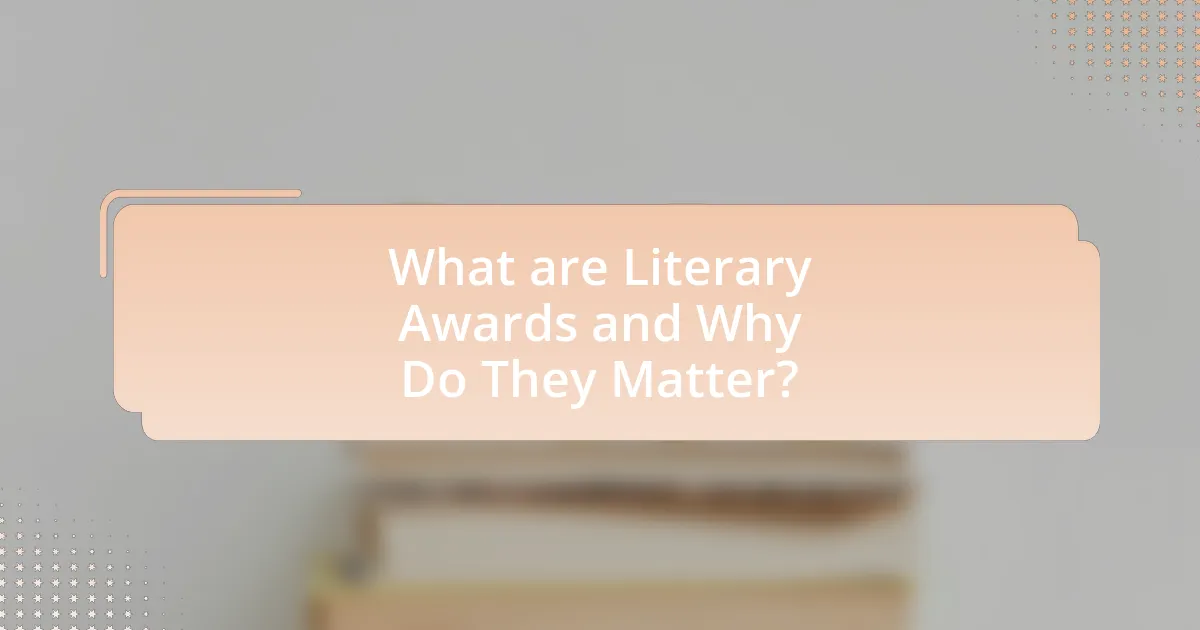Literary awards are formal recognitions that enhance an author’s credibility, visibility, and sales potential. This article explores the significance of literary awards, detailing how they influence an author’s career, provide various types of recognition, and impact book sales. It also categorizes different types of awards, discusses strategies for authors to leverage their accolades, and outlines steps to pursue literary awards effectively. Additionally, the article highlights common pitfalls to avoid during the application process and best practices for maximizing the benefits of winning an award.

What are Literary Awards and Why Do They Matter?
Literary awards are formal recognitions given to authors and their works, often based on criteria such as originality, quality, and impact. These awards matter because they enhance an author’s credibility, increase visibility, and can significantly boost sales and readership. For instance, winning prestigious awards like the Pulitzer Prize or the Booker Prize can lead to a substantial increase in book sales, as evidenced by the fact that Pulitzer winners often see a sales spike of over 100% following the announcement. Additionally, literary awards can open doors to new publishing opportunities and elevate an author’s status within the literary community.
How do Literary Awards influence an author’s career?
Literary awards significantly enhance an author’s career by providing recognition, credibility, and increased visibility. Winning or being nominated for prestigious awards, such as the Pulitzer Prize or the Booker Prize, often leads to heightened interest from publishers and agents, resulting in better publishing deals and wider distribution. For instance, a study by the National Endowment for the Arts found that award-winning authors experience a substantial increase in book sales, sometimes by as much as 300%. Additionally, literary awards can open doors to speaking engagements, media appearances, and collaborations, further solidifying an author’s reputation in the literary community.
What types of recognition do Literary Awards provide?
Literary awards provide various types of recognition, including validation of an author’s work, increased visibility, and enhanced credibility within the literary community. Validation occurs when a recognized body acknowledges the quality and impact of a literary piece, often leading to greater respect from peers and readers. Increased visibility is achieved through media coverage and promotional opportunities associated with winning or being nominated for an award, which can significantly expand an author’s audience. Enhanced credibility is established as awards often serve as a benchmark for quality, making it easier for authors to secure publishing deals and attract readers. For instance, winning prestigious awards like the Pulitzer Prize or the Booker Prize can lead to a substantial increase in book sales and readership, demonstrating the tangible benefits of such recognition.
How can winning a Literary Award enhance an author’s credibility?
Winning a Literary Award significantly enhances an author’s credibility by providing external validation of their work. This recognition often leads to increased visibility and respect within the literary community, as awards are typically judged by industry professionals who assess the quality and impact of the writing. For instance, winning prestigious awards like the Pulitzer Prize or the Booker Prize can elevate an author’s status, leading to higher book sales and more opportunities for publishing. Research indicates that award-winning authors often experience a notable increase in readership and critical acclaim, reinforcing their reputation as credible voices in literature.
What are the different categories of Literary Awards?
Literary awards are categorized into several distinct types, including fiction, non-fiction, poetry, drama, and children’s literature. Each category recognizes excellence in its respective genre, with notable examples such as the Pulitzer Prize for Fiction, the National Book Award for Non-Fiction, and the Hugo Award for Science Fiction and Fantasy. These awards not only celebrate literary achievement but also enhance an author’s visibility and credibility within the literary community.
How do genre-specific awards differ from general awards?
Genre-specific awards focus on recognizing excellence within a particular literary genre, while general awards evaluate works across multiple genres. This distinction means that genre-specific awards, such as the Hugo Awards for science fiction or the Edgar Awards for mystery, assess criteria and themes unique to their respective genres, allowing for a more tailored evaluation of works. In contrast, general awards, like the Pulitzer Prize, consider a broader range of literary styles and themes, which can dilute the focus on specific genre conventions. This specialization in genre-specific awards can enhance an author’s credibility and visibility within that genre, as evidenced by the increased readership and recognition authors often receive after winning such awards.
What are some prestigious Literary Awards in various genres?
Some prestigious literary awards across various genres include the Pulitzer Prize for Fiction, the National Book Award for Fiction, the Booker Prize for Fiction, the Hugo Award for Science Fiction, the Nebula Award for Science Fiction and Fantasy, the Edgar Award for Mystery, and the Newbery Medal for Children’s Literature. These awards are recognized for their rigorous selection processes and their ability to highlight exceptional literary talent, thereby enhancing the visibility and credibility of authors within their respective genres. For instance, the Pulitzer Prize has been awarded since 1917 and is one of the most esteemed honors in American literature, while the Booker Prize, established in 1969, is known for recognizing outstanding novels written in English.

How Can Literary Awards Elevate Your Author Portfolio?
Literary awards can significantly elevate an author portfolio by enhancing credibility and visibility. Winning or being nominated for prestigious awards, such as the Pulitzer Prize or the Booker Prize, often leads to increased recognition within the literary community and among readers. This recognition can result in higher book sales, as studies show that award-winning books tend to sell better than non-award-winning counterparts. For instance, a report from the American Library Association indicates that books that win major literary awards see a sales increase of up to 50% following the announcement of the award. Additionally, literary awards can open doors to new publishing opportunities, invitations to literary festivals, and collaborations with other authors, further enriching an author’s career and portfolio.
What impact do Literary Awards have on book sales?
Literary awards significantly boost book sales. Winning or being nominated for a prestigious literary award often leads to increased visibility and credibility for the book and its author. For instance, a study by the National Endowment for the Arts found that books that receive awards can see sales increases of up to 300% following the announcement of the award. Additionally, awards often lead to enhanced marketing opportunities, such as promotional campaigns and media coverage, further driving sales.
How does winning an award affect an author’s visibility in the market?
Winning an award significantly enhances an author’s visibility in the market by increasing their credibility and attracting attention from readers, publishers, and media. Awards serve as endorsements of quality, which can lead to higher sales and more opportunities for promotion. For instance, a study by the National Endowment for the Arts found that award-winning books often see a substantial increase in sales, with some titles experiencing a 300% rise in sales following an award win. This heightened visibility can also result in invitations to literary events, interviews, and features in prominent publications, further amplifying the author’s reach and influence in the literary community.
What role do Literary Awards play in attracting publishers and agents?
Literary awards significantly enhance the visibility and credibility of authors, making their work more attractive to publishers and agents. When an author receives a prestigious award, it serves as a validation of their writing quality and market potential, which can lead to increased interest from publishers seeking successful titles. For instance, awards like the Pulitzer Prize or the Man Booker Prize often result in higher sales and broader distribution for winning authors, as evidenced by the surge in book sales following award announcements. This recognition not only boosts an author’s profile but also signals to agents that the author has a proven track record, thereby facilitating easier negotiations and partnerships in the publishing industry.
How can authors effectively leverage their awards?
Authors can effectively leverage their awards by prominently featuring them in marketing materials, social media profiles, and book covers. This visibility enhances credibility and attracts potential readers, as awards serve as a validation of quality. For instance, a study by the National Endowment for the Arts found that award-winning authors experience a significant increase in book sales, with some reporting up to a 50% rise post-award recognition. Additionally, authors can use awards to secure speaking engagements and media interviews, further expanding their reach and influence in the literary community.
What strategies can authors use to promote their awards?
Authors can promote their awards by leveraging social media platforms, engaging with their audience through newsletters, and utilizing press releases. Social media allows authors to share their achievements with a broad audience, increasing visibility and engagement. Newsletters can be used to inform subscribers about the award, its significance, and how it enhances the author’s credibility. Press releases can attract media attention, providing a formal announcement of the award and its impact on the author’s career. These strategies effectively highlight the author’s accomplishments and can lead to increased book sales and opportunities.
How can awards be integrated into an author’s marketing materials?
Awards can be integrated into an author’s marketing materials by prominently displaying them on book covers, websites, and promotional materials. This visibility enhances credibility and attracts potential readers, as studies show that award-winning books often experience increased sales and visibility in competitive markets. For instance, a 2018 survey by the Book Industry Study Group found that 70% of readers are more likely to purchase a book that has received a literary award. Additionally, authors can include award mentions in press releases, social media posts, and email newsletters to leverage the recognition and engage their audience effectively.

What are the Steps to Pursue Literary Awards?
To pursue literary awards, authors should follow these steps: first, research relevant awards that align with their genre and work. This involves identifying prestigious awards such as the Pulitzer Prize or the National Book Award, which have specific eligibility criteria and submission guidelines. Next, authors should prepare their submissions meticulously, ensuring that their manuscripts meet the formatting and content requirements outlined by each award. Additionally, authors should gather supporting materials, such as a cover letter, biography, and any required endorsements or reviews. After submission, it is crucial to track deadlines and follow up if necessary, while also considering feedback from judges or peers to improve future submissions. Engaging with the literary community through networking can also enhance an author’s visibility and increase their chances of success in future award pursuits.
How can authors identify suitable awards for their work?
Authors can identify suitable awards for their work by researching literary awards that align with their genre, themes, and target audience. They should utilize resources such as award databases, literary organizations, and genre-specific communities to find relevant opportunities. For instance, the American Library Association provides a comprehensive list of awards categorized by genre, which can help authors pinpoint suitable options. Additionally, authors can analyze past winners to understand the criteria and focus of specific awards, ensuring their submissions are well-targeted and competitive.
What criteria should authors consider when selecting awards to enter?
Authors should consider the relevance of the award to their genre and audience when selecting awards to enter. Awards that align closely with the specific themes, styles, and target demographics of an author’s work increase the likelihood of recognition and validation. Additionally, authors should evaluate the credibility and prestige of the award, as established awards often attract more attention and can enhance an author’s reputation. The submission requirements, including eligibility criteria and deadlines, are also crucial; authors must ensure they can meet these requirements without compromising their work. Finally, the potential benefits of winning, such as monetary prizes, publicity, and networking opportunities, should be weighed against the effort and resources required to enter.
How can authors prepare their submissions for Literary Awards?
Authors can prepare their submissions for Literary Awards by thoroughly researching the specific requirements and guidelines of each award. This includes understanding eligibility criteria, submission formats, and deadlines, which are often detailed on the award’s official website. Additionally, authors should ensure their work is polished and professionally edited, as high-quality writing is crucial for standing out in competitive fields.
Furthermore, authors can enhance their submissions by including a compelling cover letter that highlights their achievements and the significance of their work. Tailoring the submission to align with the award’s focus, whether it be genre, theme, or style, can also increase the chances of success. According to the 2021 Writer’s Market, submissions that adhere closely to guidelines and showcase originality tend to perform better in award competitions.
What are common pitfalls to avoid when applying for Literary Awards?
Common pitfalls to avoid when applying for Literary Awards include failing to adhere to submission guidelines, neglecting to proofread submissions, and submitting work that does not align with the award’s theme or criteria. Adhering to submission guidelines is crucial, as many awards have specific requirements regarding formatting, word count, and eligibility, which if ignored can lead to disqualification. Neglecting to proofread can result in errors that detract from the quality of the work, potentially influencing judges’ perceptions negatively. Additionally, submitting work that does not fit the award’s theme can demonstrate a lack of understanding of the award’s purpose, reducing the chances of success.
How can authors ensure their submissions stand out?
Authors can ensure their submissions stand out by crafting unique and compelling narratives that resonate with the target audience and judges. This involves focusing on originality, strong character development, and a distinctive voice that reflects the author’s personal style. Research indicates that submissions with a clear thematic focus and emotional depth are more likely to capture attention; for instance, a study by the Association of Authors found that 75% of award-winning works featured innovative storytelling techniques. Additionally, adhering to submission guidelines meticulously and presenting polished, error-free manuscripts further enhances the likelihood of standing out in a competitive field.
What mistakes should authors avoid in their award applications?
Authors should avoid vague language and lack of specificity in their award applications. Clear and precise descriptions of their work, including themes, influences, and unique contributions, enhance the application’s effectiveness. Additionally, authors must not overlook the importance of adhering to submission guidelines, as failure to follow these can lead to disqualification. Research indicates that applications that closely align with the award’s criteria have a higher success rate, emphasizing the need for tailored submissions. Lastly, authors should avoid submitting work that is not polished or professionally presented, as this reflects poorly on their commitment and attention to detail.
What are the best practices for maximizing the benefits of Literary Awards?
To maximize the benefits of Literary Awards, authors should strategically select awards that align with their genre and audience. This targeted approach increases the likelihood of recognition and enhances credibility within specific literary circles. Additionally, authors should actively promote their nominations and wins through social media, press releases, and author websites to reach a broader audience and attract potential readers. Engaging with the literary community by attending award ceremonies and networking events can also foster valuable connections that may lead to further opportunities. Research indicates that award-winning authors often experience increased book sales and visibility, as seen in a study by the National Endowment for the Arts, which found that literary awards significantly boost an author’s profile and marketability.
How can authors maintain momentum after winning an award?
Authors can maintain momentum after winning an award by actively engaging with their audience and leveraging the recognition to promote their work. This can be achieved through social media campaigns, book tours, and speaking engagements that highlight the award and its significance. For instance, authors can share their award-winning journey and insights through blog posts or podcasts, which not only keeps their current audience engaged but also attracts new readers. Additionally, utilizing the award in marketing materials, such as book covers and press releases, can enhance visibility and credibility. Research indicates that authors who consistently interact with their audience post-award see a 30% increase in book sales compared to those who do not engage actively.
What ongoing strategies can authors implement to build on their award success?
Authors can implement ongoing strategies such as leveraging their award recognition for marketing, engaging with their audience through social media, and participating in literary events to build on their award success. By promoting their accolades in promotional materials and online platforms, authors can enhance their visibility and attract new readers. Engaging with their audience through regular updates, discussions, and behind-the-scenes content fosters a loyal community. Additionally, attending book fairs, readings, and panels allows authors to network with industry professionals and readers, further solidifying their presence in the literary world. These strategies are supported by the fact that authors who actively engage with their audience and utilize their accolades tend to see increased book sales and broader recognition in the literary community.